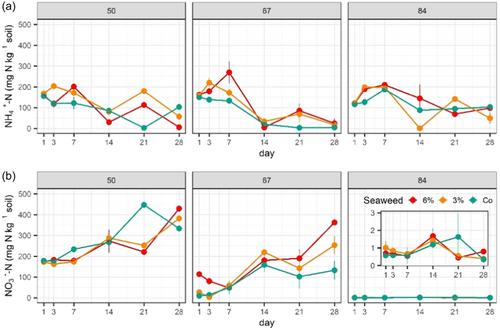Seaweed supplementation to organic dairy cows may reduce climate impact of manure in pasture soils during a laboratory incubation
Abstract
Introduction
Enteric methane (CH4) emissions are one of the largest components of the anthropogenic CH4 budget, and with accelerating climatic changes, there are calls to reduce anthropogenic greenhouse gas emissions. Certain seaweeds fed as supplements can reduce enteric CH4 emissions from ruminant animals by as much as 80%; however, these studies have yet to analyze downstream impacts that may arise from the deposit of affected manures on pastures or agricultural fields.
Materials and Methods
Here we conducted a 28-day soil and manure incubation utilizing manures collected from dairy cows in a seaweed feeding trial to analyze the impacts of manure on greenhouse gas fluxes and nutrient cycling. Cows were fed different diets with a control group (no seaweed supplementation), and a 3% and 6% by dry-weight seaweed (Chondrus crispus) supplementation. Three soil moisture treatments were also tested, with a field moist capacity [67% gravimetric water content (GWC)], a drier group (50% GWC), and a saturated treatment (84% GWC).
Results
We found that manure from seaweed-fed cows reduced emissions of carbon dioxide and had similar emissions of methane and nitrous oxide to the control. Higher moisture levels increased CH4 emissions and nitrous oxide emissions with CH4 emissions trending higher in seaweed supplements trending higher in. Inorganic nitrogen turnover varied more based on moisture levels than seaweed supplements, as did the magnitude of methane and nitrous oxide emissions. Total carbon and nitrogen mostly decreased except in the 3% seaweed supplementation, which increased carbon and nitrogen with a drop in C:N in the 50% GWC group.
Conclusion
Seaweed supplements may partially reduce climate impacts of manures from cows fed seaweed supplements or at least not cause harm or impact manure quality. Given feeds may reduce enteric CH4 emissions, they may be a part of a successful strategy to reduce climate impacts of cattle.


 求助内容:
求助内容: 应助结果提醒方式:
应助结果提醒方式:


